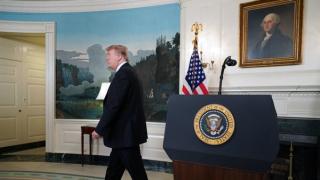You could feel the panic wafting off the presidential Twitter feed.
In less than 24 hours, Donald Trump spit out more than a dozen tweets in response to the sweeping indictments handed down by the Justice Department’s special counsel on Friday. Thirteen Russians and three Russian companies face charges of criminally interfering with the 2016 presidential election. And while the charges did not touch on the issue of collusion with the Trump campaign, the President quickly lashed out on Twitter, attacking everyone from his National Security Adviser to Barack Obama to the FBI.
It was one of those moments that crystallised the crisis in the US: the country has no national leader. And without a leader, it is daily becoming less safe and more chaotic.
It was one of those moments that crystallised the crisis in the US: the country has no national leader. And without a leader, it is daily becoming less safe and more chaotic.
The cost of leaderlessness is most clear in the case of Russian interference in the election. For more than a year, the intelligence community in the US has unanimously affirmed that Russia interfered in the 2016 election as part of a broader effort to destabilise the country. A Republican-led Congress has authorised more sanctions against Russia in retaliation. But the White House has declined to act — in large part because the President refuses to acknowledge the underlying bad act of interference.
Trump can’t acknowledge the interference, no matter how much evidence accrues, because he sees it as tainting his electoral victory. His ego, as fragile as it is massive, can’t take the blow. If the consequences of his ego-driven leadership style were only embarrassing tics, like handing out electoral maps showing his victory to Oval Office visitors, it wouldn’t be a national crisis. But instead, it’s preventing the government from protecting the integrity of the electoral system.
That’s a real problem, given that the intelligence community has expressed high confidence that Russia intends to interfere in the 2018 and 2020 elections. Wittingly or not, Trump’s inaction helps Russian leaders further their goal of shredding Americans’ faith in their electoral system, and thus their democracy.
Russian interference isn’t the only area in which America’s leadership vacuum is causing problems. The recent school shooting in Parkland, Florida, in which 17 people were killed, was one of the deadliest school shootings in US history (a claim for which there is, horrifyingly, quite a lot of competition). The shock of another mass killing spree rippled through the country, a fresh wave of grief and horror in a nation that has all too many occasions to mourn the slaughter of young people in wholly preventable tragedies.
Moments like this call for national leadership, which Trump could not provide. Instead, he deflected. Unwilling to suggest lax gun laws contributed to the massacre, he tut-tutted on Twitter that someone should have reported the shooter to the authorities. When it was pointed out that many people had — and that because of lax gun laws, authorities couldn’t act on those reports — he pivoted again, grotesquely claiming that the FBI’s work on the Russian collusion case had caused the agency to miss the shooter’s violent potential.
Moments like this call for national leadership, which Trump could not provide. Instead, he deflected.
It is difficult to overstate what a failure of leadership this is. Presidents have come to take on an important role in times of national tragedy, called to both comfort and lead. Ronald Reagan consoled the nation following the Challenger space shuttle disaster. Bill Clinton delivered a moving eulogy following the Oklahoma City bombing. George W. Bush stood on the rubble of the World Trade Centre to assure New Yorkers their city would be rebuilt. Barack Obama shed tears as he spoke of a way forward following the Sandy Hook massacre, in which 20 people, many of them kindergarteners, were killed.
We can criticise the policies that followed these events, but when the nation needed healing, these presidents stepped up.
President Trump has not. Again and again, he has chosen self-protection over national leadership, doing everything possible to evade blame and shield his own reputation. He has failed to display, at any point in his tenure, a sense of duty to country that rises above his own self-interest. Not once, in over a year. And just because we shouldn’t be surprised by that — Trump has never shown a sense of self-negating duty at any point in his public life — doesn’t mean we should be repulsed by it.
When Franklin Roosevelt was running for president in 1932, he sat down for an interview with The New York Times, in which he spelled out his understanding of the office for which he was running. “The presidency is not merely an administrative office. That’s the least of it,” he said. “It is pre-eminently a place of moral leadership.”
From George Washington’s voluntary abdication of power after eight years as president to Abraham Lincoln’s storied honesty, the presidency had long been a place for politicians to set an example for the nation. And while presidents have hardly been paragons of personal virtue — far from it — they have taken seriously the call to provide moral leadership.
Donald Trump does not. And so while he spends his days on Twitter defending the legitimacy of his electoral victory, he leaves the office itself vacant.






